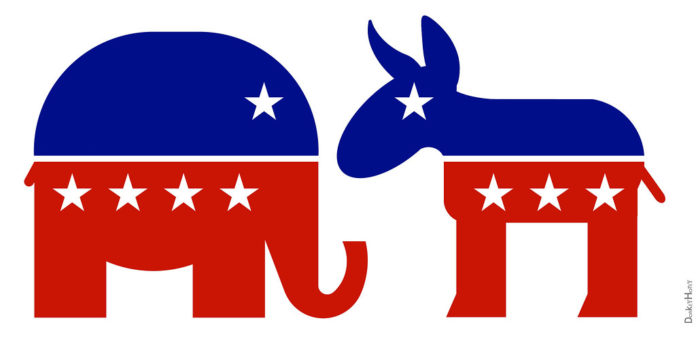By Kendan Bendt
Copy Editor
The two party system is awful. It reinforces a tight Overton window, or range of politically “acceptable” viewpoints. Certain ideas and policies simply cannot be discussed for fear of angering voters who are already too entrenched in their separate camps.
The Green New Deal was shot down because it was too far left, even though some of its policy prescriptions are relatively moderate compared to many European countries’ climate policies. Bernie Sanders is a radical leftist in America, but would perhaps be a moderate somewhere like Sweden or Germany.
In 2012, Ron Paul ran under the Republican banner with a decidedly libertarian or classically liberal campaign, and was laughed out of interviews and debates (or worse, left out of media coverage) because his views threatened the established order of the Republican platform.
In 2020, Andrew Yang ran as a Democrat with a new-school moderate perspective: not left, not right, but forward. This was, of course, out of line with the established way of things under the two party system. He was covered with pictures of other Asian men and the wrong name, had his credibility undermined, and his microphones muted at debates. The political system (donors, lobbyists, politicians, parties, media) will do anything to silence those who would threaten the established order.
Democrats and Republicans are not that far apart in terms of their policies. They may campaign as though they were on opposite sides of a vast ideological chasm, but when they arrive in office, they act much the same. Corporate bailouts, bombing civilians in other nations, reneging on key promises (or worse, agreeing to compromises that typically neuter the policy and at worst make it unrecognizable), all because it helps them establish a healthy range of what they can “actually get done” and campaign on getting the other side out of power because they are preventing them from enacting all the policies that they really want to. In essence, though both parties campaign on being vastly apart from their opponent, they are doing this only so that they can scapegoat the “enemy” party when they do nothing to change the status quo.
It is useful for Democrats and Republicans when our generation is quick to cry “a vote for (not my preferred candidate) is a vote for (candidate I absolutely despise),” because we bully each other into believing things and voting for their candidates without them having to lift a finger.
The solution is to vote according to your conscience – something that nowadays is often scoffed at. Are you a leftist disgusted by Joe Biden’s milquetoast proposals and his nomination of Kamala Harris as VP because of her record as a prosecutor? Vote for the Green Party! Howie Hawkins is running a great campaign. You could even write in Bernie Sanders! Are you tired of making excuses for Donald Trump’s increasing grabs at power and blatant disregard of the truth? Vote Jo Jorgensen! The Libertarian Party is making a push into the right wing sphere of thought and trying to change many right-wingers’ outlook on politics.
The more we give into fear and the idea that this election is always the most important election in recent memory, the more the establishment wins. Nothing gets better for anyone but those who benefit from the system-lobbyists, corporate donors, congresspeople, and politicians. Both sides will use the anger you feel when nothing changes to convince you to vote for them again. No really, they’ll do something about it this time!


















